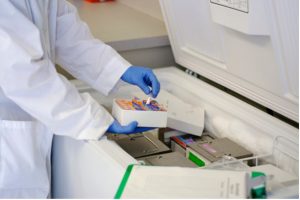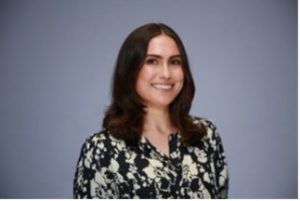“Study what interests you and the rest will work itself out”
As a high achieving high school student, choosing a college major felt like choosing a career. I remember placing so much pressure on picking my college of study. Then I got some very simple advice from my career counselor at the time. She said, “study what interests you and the rest will work itself out.”
My favorite subject throughout my education was biology – so the College of Science it was!
After my sophomore year of college, I encountered Intellectual Property (IP) for the very first time. At the time, I was in a summer internship at a startup drug company. The company was pursuing a patent for their renal drug and it fascinated me, I just didn’t realize that patents are IP until years down the line.
After graduation I began working at Cardinal Health, in their leadership development rotational program. This program allowed me to experience three unique marketing roles in three years. I realized that I valued healthcare as an enduring yet evolving industry. It could never become stale. Similarly, healthcare workers could never become complacent because the stakes were always high. Innovation in healthcare was crucial for success.
During my first year in the program, I quickly learned that while I found meaning and purpose in the healthcare industry, my role as a marketer wasn’t the right fit. Marketers typically only work with a finished product and package it in a way that is palatable for consumers. They live at the end of the innovation cycle. I wanted to be more involved with the scientific innovation process instead of the final product. It wasn’t until I met an attorney who officially introduced me to the world of IP that I discovered how I would find my way to the innovation process.
A Career in Healthcare with an Unexpected Result
At one of my leadership conferences, an amazing attorney, who later became a mentor, ran a workshop on personal branding. I felt a pull to learn more about her career journey. Once we connected, she explained all the ways healthcare and law intersect, specifically through IP. She explained the crucial need for patent protection in the biopharmaceutical space and the role that an IP lawyer plays. I learned that I could make an impact on scientific innovations by pursuing a career in IP. Everything clicked! It felt like I found a missing puzzle piece I was looking for. I realized I encountered IP multiple times before in previous jobs without even knowing it! From this point on, I was hooked.
I had officially made my decision to attend law school in the future, but I decided to complete the three-year rotational program at Cardinal Health first. My last job brought me to the Biopharma Specialty Solutions marketing team. I spent most of my time working in parallel with regulatory experts to promote Cardinal Health’s regulatory solutions for cell and gene therapies and biosimilars – both considered to be cutting edge areas of the biopharmaceutical industry.
I worked with regulatory experts who previously presented in front of the United States Patent and Trademark Office (USPTO) and the FDA. At Cardinal Health, these experts consulted with cell and gene drug companies to develop the best regulatory pathway, reduce compliance issues, and increase speed to market. While doing this work, I couldn’t stop thinking about what it would look to work with these drug companies once they were ready to apply for and hopefully receive a patent from the USPTO. This gave me a glimpse into the world of regulatory drug development and sparked my desire to learn more about IP.

Taking the Leap to Pursue IP
After working, I knew that I wanted to pursue my JD and had a strong interest in becoming a patent attorney. During my first semester at Loyola, I immediately got involved with the IP Law Society at Loyola and Intellectual Property Law Association of Chicago (IPLAC), working with mentors from both programs. My mentor in IPLS guided my 1L experience by introducing me to resources at Loyola for students with an IP or Patent interest, giving me advice on navigating the patent bar, and recommending what classes to take in the future, such as IP Law, IP litigation, and IP and technology licensing. My IPLAC mentor shared insight about his work, invited me to IP events in Chicago, and introduced me to another attorney who does patent litigation for generic drugs, which I have a strong interest in.
My interests have led me to an IP career.
I never guessed that choosing to study the subjects I love would have brought me to law school. I came into law school with a general interest in patents, but no significant knowledge about the practice of patent law. Everything I’ve learned about IP in my first year only reinforces my interest in pursuing a career in IP. I have discovered the difference between patent prosecution, which includes writing and filing a patent application, and patent litigation, which resolves infringement on already existing patents. I was exposed to the way IP litigators approach their arguments often takes a lot of creativity. The IP industry is fast paced and always evolving. Most importantly, my science background and future law degree will play together nicely in an IP career.
The things I have learned about in IP are only the tip of the iceberg. I am excited to learn more about how IP works and how I can contribute to the scientific innovations I feel so passionate about as an attorney.

Elizabeth Schrieber
Assistant Blogger
Loyola University Chicago School of Law, J.D. 2025
